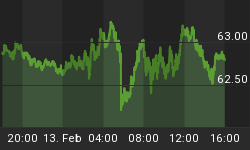Summary
Did you know that during the 10 often-troubled years of 1972 through 1981, mutual funds disinvested in stocks during all 10 them? Does this piece of history provide an important warning about the contemporary situation? An examination of this question frames this second installment of the "Did You Know?" Series.
Introduction
This second installment of "Did You Know?" is out of its originally anticipated sequence. Number two was going to examine the impact rising interest rates might have this year on corporate profits. This is more than a worthy topic in the present environment; I will get to it soon.
However, the first "DYK" installment evoked a response from several people that came in the form of a question. A solid question, too, that has inspired the current missive. The question went something like:
"When it arrives, how will I recognize the public's stock-market capitulation?"
This was in response to my observation that stated:
"I have a few key reasons for maintaining [my secular bear market] view, with the following being one of the less scientific. There simply never has been nearly the degree of capitulation by the so-called 'public' that one would expect during an episode as protracted and periodically painful as the one we have experienced."
As was the case in the first installment, I am again going to call upon the great secular bear market of the 1965-1982 era for guidance regarding the current environment. Here goes. http://www.gillespieresearch.com/cgi-bin/s/article/id=457
















